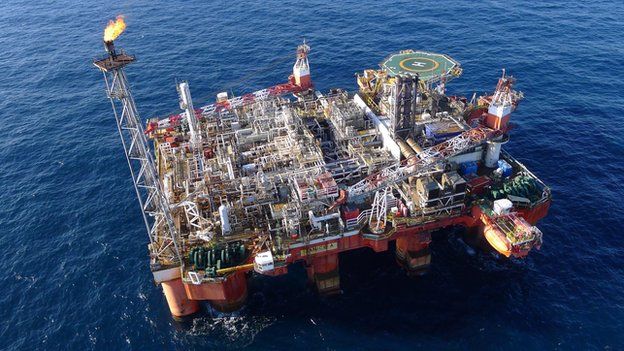Shipping giant Maersk to split up and focus on North Sea
- Published

Maersk, the Copenhagen-based shipping giant, is to be split up with its energy interests directed more towards the North Sea.
The family-owned firm, formally known as AP Moller-Maersk, will focus on its transport and logistics business.
The energy division is to shrink its global reach and focus more on the North Sea, where it has expertise.
That division has around 800 employees based in Aberdeen, working both on and offshore.
The company employs 88,000 people and operates across 130 countries, with turnover of more than $40bn (£31bn).
Work will continue on existing energy projects, including some of the biggest projects in the UK offshore sector. But the company signalled that new investment commitments may be low, particularly in tankers and drilling.
Maersk Oil has been operating in the UK central North Sea sector for 11 years, and is a partner in some of the biggest developments during that time, including the Golden Eagle.
Analysis by Douglas Fraser, Business/economy editor, Scotland
From a small country perspective, Maersk looks like a giant. So it is uncomfortable for Denmark that the giant has been weakened in both legs.
Shipping has been hit by sharp reductions in rates for containers - a notoriously volatile market. That is partly due to a downturn in trade, and also to the extra tonnage added to the world container fleet.
Hanjin Shipping, the seventh-biggest in container transport and based in South Korea, recently filed for bankruptcy. It is struggling to find the finance to offload cargo from its ships, worth several billion pounds.
Maersk's energy business faces problems which are at least as deep as shipping, due to the fall in the price of oil. The company's strategic review speaks of finding "solutions" including joint ventures, mergers or spinning off companies for separate listing. The vagueness of the plan makes it look like an intention to exit as much of that sector as possible, and shipping is clearly the priority.
The North Sea presence may be one part of the energy division that is retained, as the technology involved is an area of expertise. That's unless a buyer can be found.
Breaking up the 112-year-old conglomerate is a reversal of the strategy under which Maersk Line grew to have a fleet of 590 ships, plus 500 smaller service ships. It was guided by its chairman Maersk McKinney Moller, who remained active in the company until his death four years ago, aged 98.
It is operator of the Culzean gas field development, which is one of the biggest in UK waters for 25 years. It is expected to meet 5% of Britain's gas demand after it comes on-stream, scheduled for 2019.
Its other production is from Denmark, Qatar, Kazakhstan, the US Gulf of Mexico and Algeria. Exploration and development activities are also under way in Angola, Kenya, Ethiopia, Greenland, Brazil, Kurdistan, and the huge Johan Sverdrup field being developed in the Norwegian North Sea.
Michael Pram Rasmussen, the chairman, said in a statement: "Separating our transport and logistics businesses and our oil and oil related businesses...will enable both to focus on their respective markets. Both face very different underlying fundamentals and competitive environments."
The oil, drilling, offshore services and tanker divisions face moves towards joint ventures, sales and stock market floats over the next two years. Profits in that division have recently come in well below expectations.
Key development projects
The company's strategy states: "Maersk Oil will adjust its current strategy to focus its portfolio in fewer geographies to gain scale in basins, particularly in the North Sea, where it can leverage its strong capabilities within subsurface modelling, well technology and efficient operations. Maersk Oil will aim to strengthen its portfolio through acquisitions or mergers.
"Further, Maersk Oil will mature existing key development projects, while keeping exploration activities and expenses at a low level. While the strategic focus will be reflected in a disciplined capital allocation, investments in strategic projects already sanctioned or under development will continue as planned.
"Maersk Drilling, Maersk Supply Services, and Maersk Tankers will continue to optimise their market position and operation with the existing fleet and order book. Additional investments in the group's offshore service businesses and Maersk Tankers will be limited."
Denmark's Sydbank estimated the value of the logistics business at, very roughly, £23bn. Its central estimate for the energy division was close to £13bn.
- Published7 April 2016
- Published31 August 2015